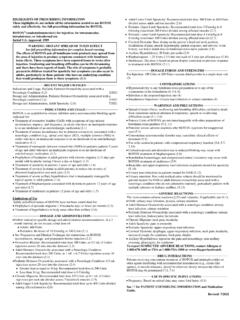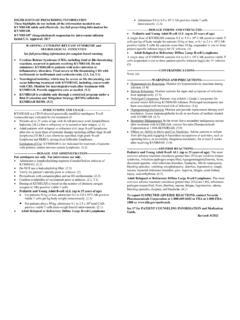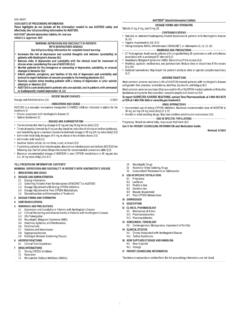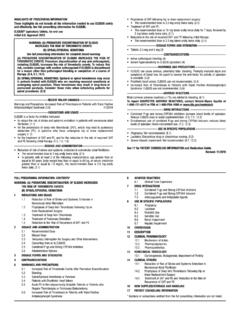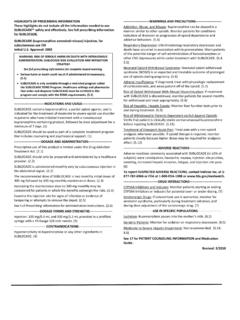Transcription of DOSAGE AND ADMINISTRATION HIGHLIGHTS OF …
1 1 HIGHLIGHTS OF prescribing information These HIGHLIGHTS do not include all the information needed to use SOLIRIS safely and effectively. See full prescribing information for SOLIRIS. SOLIRIS (eculizumab) injection, for intravenous use Initial Approval: 2007 WARNING: SERIOUS MENINGOCOCCAL INFECTIONS See full prescribing information for complete boxed warning Life-threatening and fatal meningococcal infections have occurred in patients treated with Soliris and may become rapidly life-threatening or fatal if not recognized and treated early ( ). Comply with the most current Advisory Committee on Immunization Practices (ACIP) recommendations for meningococcal vaccination in patients with complement deficiencies ( ).
2 Immunize patients with meningococcal vaccines at least 2 weeks prior to administering the first dose of Soliris, unless the risks of delaying Soliris therapy outweigh the risks of developing a meningococcal infection. (See Warnings and Precautions ( ) for additional guidance on the management of the risk of meningococcal infection.) Vaccination reduces, but does not eliminate, the risk of meningococcal infections. Monitor patients for early signs of meningococcal infections, and evaluate immediately if infection is suspected. Soliris is available only through a restricted program under a Risk Evaluation and Mitigation Strategy (REMS).
3 Under the Soliris REMS, prescribers must enroll in the program ( ). _____ INDICATIONS AND USAGE _____ Soliris is a complement inhibitor indicated for: The treatment of patients with paroxysmal nocturnal hemoglobinuria (PNH) to reduce hemolysis ( ). The treatment of patients with atypical hemolytic uremic syndrome (aHUS) to inhibit complement-mediated thrombotic microangiopathy ( ). Limitation of Use Soliris is not indicated for the treatment of patients with Shiga toxin E. coli related hemolytic uremic syndrome (STEC-HUS). The treatment of generalized myasthenia gravis (gMG) in adult patients who are anti-acetylcholine receptor (AchR) antibody positive ( ).
4 The treatment of neuromyelitis optica spectrum disorder (NMOSD) in adult patients who are anti-aquaporin-4 (AQP4) antibody positive ( ). _____ DOSAGE AND ADMINISTRATION_____ For intravenous infusion only PNH DOSAGE Regimen: ( ) aHUS DOSAGE Regimen: ( ) gMG and NMOSD DOSAGE Regimen: ( ) _____ DOSAGE FORMS AND STRENGTHS _____ Injection: 300 mg/30 mL (10 mg/mL) in a single-dose vial (3). _____ CONTRAINDICATIONS _____ Soliris is contraindicated in: Patients with unresolved serious Neisseria meningitidis infection (4). Patients who are not currently vaccinated against Neisseria meningitidis, unless the risks of delaying Soliris treatment outweigh the risks of developing a meningococcal infection ( ).
5 _____ WARNINGS AND PRECAUTIONS _____ Discontinue Soliris in patients who are being treated for serious meningococcal infections ( ). Use caution when administering Soliris to patients with any other systemic infection ( ). Infusion-Related Reactions: Monitor patients during infusion, interrupt for reactions, and institute appropriate supportive measures ( ) _____ ADVERSE REACTIONS _____ The most frequently reported adverse reactions in the PNH randomized trial ( 10% overall and greater than placebo) are: headache, nasopharyngitis, back pain, and nausea ( ). The most frequently reported adverse reactions in aHUS single arm prospective trials ( 20%) are: headache, diarrhea, hypertension, upper respiratory infection, abdominal pain, vomiting, nasopharyngitis, anemia, cough, peripheral edema, nausea, urinary tract infections, pyrexia ( ).
6 The most frequently reported adverse reaction in the gMG placebo-controlled clinical trial ( 10%) is: musculoskeletal pain ( ). The most frequently reported adverse reactions in the NMOSD placebo- controlled trial ( 10%) are: upper respiratory infection, nasopharyngitis, diarrhea, back pain, dizziness, influenza, arthralgia, pharyngitis, and contusion ( ) To report SUSPECTED ADVERSE REACTIONS, contact Alexion Pharmaceuticals, Inc. at 1-844-259-6783 or FDA at 1-800-FDA-1088 or See 17 PATIENT COUNSELING information and Medication Guide. Revised: 11/2020 FULL prescribing information : CONTENTS* WARNING.
7 SERIOUS MENINGOCOCCAL INFECTIONS 1 INDICATIONS AND USAGE Paroxysmal Nocturnal Hemoglobinuria (PNH) Atypical Hemolytic Uremic Syndrome (aHUS) Generalized Myasthenia Gravis (gMG) Neuromyelitis Optica Spectrum Disorder (NMOSD) 2 DOSAGE AND ADMINISTRATION Recommended Vaccination and Prophylaxis Recommended DOSAGE Regimen PNH Recommended DOSAGE Regimen aHUS Recommended DOSAGE Regimen gMG and NMOSD Dose Adjustment in Case of Plasmapheresis, Plasma Exchange, or Fresh Frozen Plasma Infusion Preparation ADMINISTRATION 3 DOSAGE FORMS AND STRENGTHS 4 CONTRAINDICATIONS 5 WARNINGS AND PRECAUTIONS Serious Meningococcal Infections Other Infections Monitoring Disease Manifestations after Soliris Discontinuation Thrombosis Prevention and Management Infusion-Related Reactions 6 ADVERSE REACTIONS Clinical Trial Experience Immunogenicity Postmarketing Experience 8 USE IN SPECIFIC POPULATIONS Pregnancy Lactation Pediatric Use Geriatric Use 11 DESCRIPTION 2 12 CLINICAL PHARMACOLOGY Mechanism of Action
8 Pharmacodynamics Pharmacokinetics 13 NONCLINICAL TOXICOLOGY Carcinogenesis, Mutagenesis, Impairment of Fertility 14 CLINICAL STUDIES Paroxysmal Nocturnal Hemoglobinuria (PNH) Atypical Hemolytic Uremic Syndrome (aHUS) Generalized Myasthenia Gravis (gMG) Neuromyelitis Optica Spectrum Disorder (NMOSD) 16 HOW SUPPLIED/STORAGE AND HANDLING 17 PATIENT COUNSELING information *Sections or subsections omitted from the full prescribing information are not listed. 3 FULL prescribing information WARNING: SERIOUS MENINGOCOCCAL INFECTIONS Life-threatening and fatal meningococcal infections have occurred in patients treated with Soliris.
9 Meningococcal infection may become rapidly life-threatening or fatal if not recognized and treated early [see Warnings and Precautions ( )]. Comply with the most current Advisory Committee on Immunization Practices (ACIP) recommendations for meningococcal vaccination in patients with complement deficiencies. Immunize patients with meningococcal vaccines at least 2 weeks prior to administering the first dose of Soliris, unless the risks of delaying Soliris therapy outweigh the risk of developing a meningococcal infection. [See Warnings and Precautions ( ) for additional guidance on the management of the risk of meningococcal infection].
10 Vaccination reduces, but does not eliminate, the risk of meningococcal infections. Monitor patients for early signs of meningococcal infections and evaluate immediately if infection is suspected. Soliris is available only through a restricted program under a Risk Evaluation and Mitigation Strategy (REMS). Under the Soliris REMS, prescribers must enroll in the program [see Warnings and Precautions ( )]. Enrollment in the Soliris REMS program and additional information are available by telephone: 1-888-SOLIRIS (1-888-765-4747) or at 1 INDICATIONS AND USAGE Paroxysmal Nocturnal Hemoglobinuria (PNH) Soliris is indicated for the treatment of patients with paroxysmal nocturnal hemoglobinuria (PNH) to reduce hemolysis.
